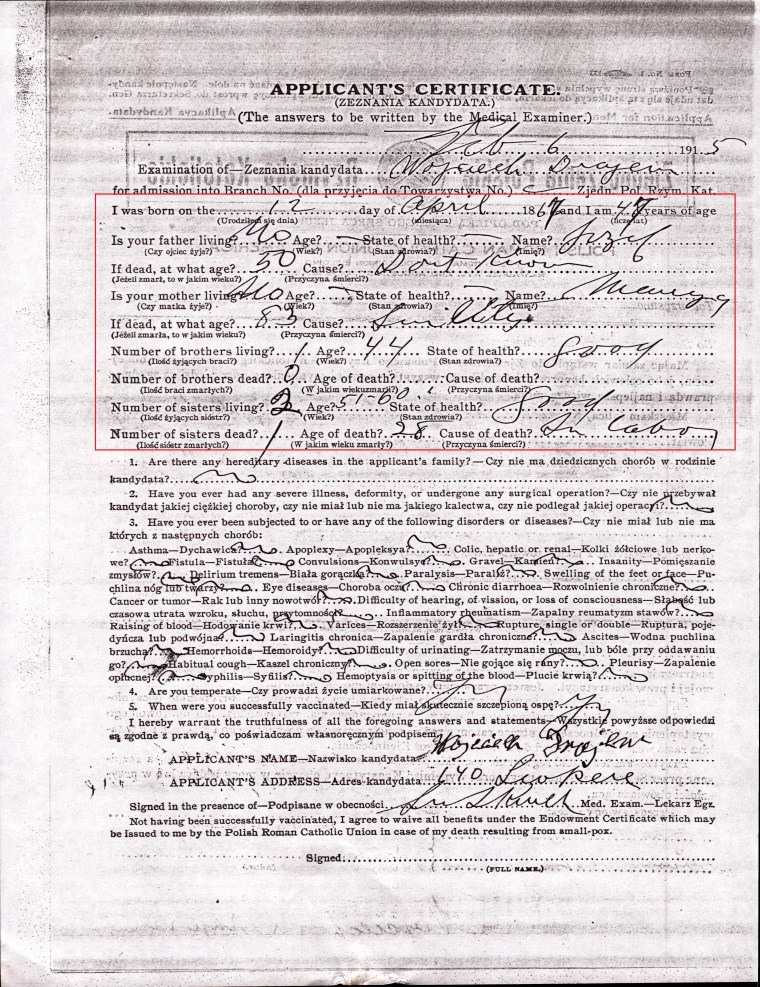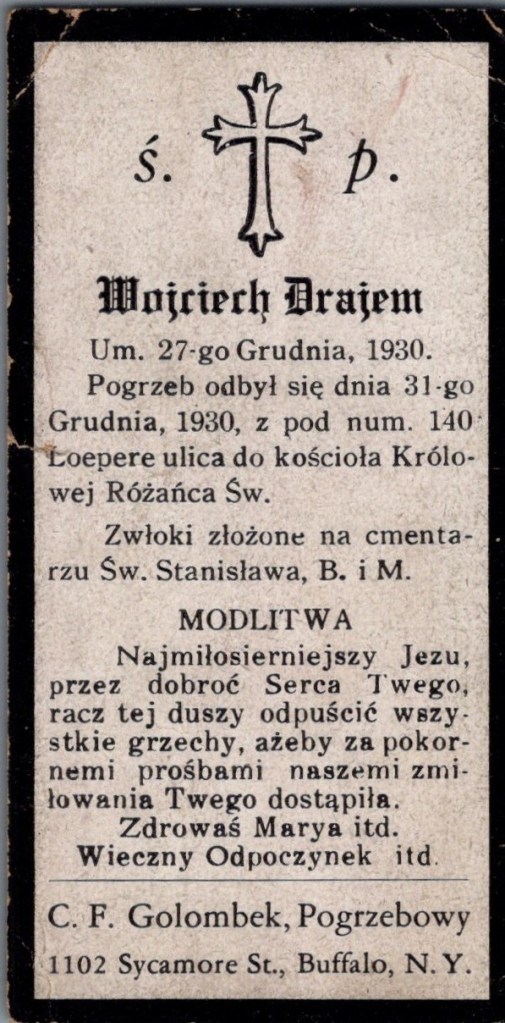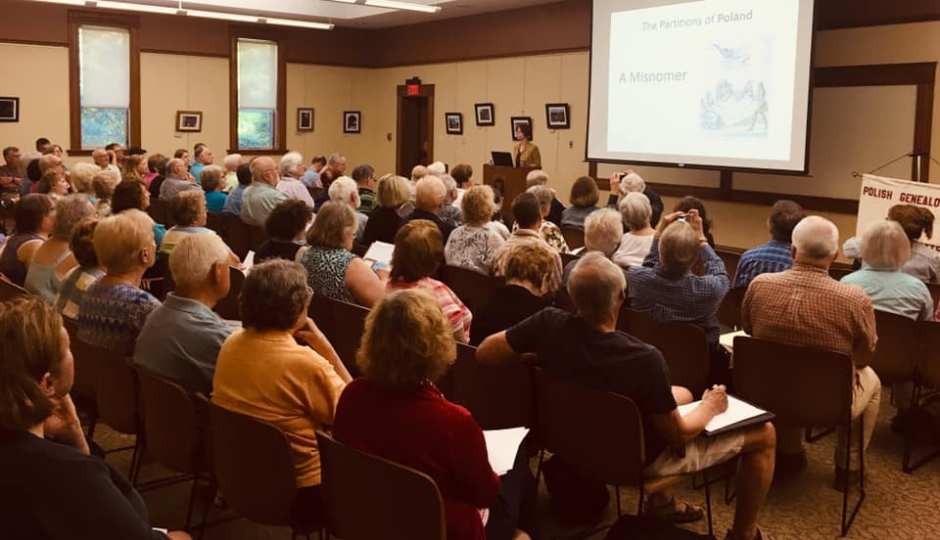In January, I started a new term as President of the Polish Genealogical Society of New York State (PGSNYS). I’m excited to be serving in this role, despite the learning curve that comes with any new position. Although my duties as President have cut into my available time for research and writing, I’m rolling up my sleeves and giving it my best effort, because I believe in the work that the PGSNYS is doing.
Some of you may be wondering if there’s still a role for traditional genealogical societies in era of internet genealogy—whether the focus is Polish research, or anything else. I confess that there was a time in my life when I, too, wondered if the success of Facebook genealogy groups might spur the demise of traditional genealogical societies. And don’t misunderstand me; I’m still a fan of Facebook genealogy groups, for all the reasons I wrote about previously. While parts of that post are outdated (Facebook has changed quite a bit since 2016!), Facebook groups continue to be great resource for genealogists. However, I believe that traditional genealogical societies serve as a complement to Facebook groups, offering unique value, and they deserve our support. Here’s what your membership to a genealogical society provides:
Personal Research Assistance
Most genealogical societies offer some form of personal research assistance to their members, in the form of planned outreach events like PGSNYS’s spring and fall Genealogy Fairs, or the upcoming spring conference of the Polish Genealogical Society of Massachusetts (PGSMA), with the theme, “Whom Do I Ask? Grandma and Grandpa Are Gone.” The genealogical community is typically generous, and most societies have experienced researchers among their members who are willing to offer some guidance for those who are just starting out. Bear in mind that “research guidance” doesn’t mean that the society’s volunteers will create an entire family tree for you, but they can often suggest resources and strategies to help you further your research goals. In some cases, a donation to the society is requested in exchange for simple look-ups, or more in-depth research in local resources, performed by volunteers from the society. The Ontario Genealogical Society is one group whose services I have personally used for onsite research into records pertaining to my ancestors living in the Niagara Peninsula.
Access to the Society’s Newsletter or Journal
Whether it’s Rodziny, published by the Polish Genealogical Society of America (PGSA), the Western New York Genealogist, published by the Western New York Genealogical Society, PGSNYS’ own Searchers, or the scholarly National Genealogical Society Quarterly, most or all genealogical societies offer some form of publication which is a benefit of membership. These publications typically contain articles written by society members about their own family history research, which illustrate their use of methodology and resources. Additional content may include book reviews, research library acquisitions, website tutorials, and news regarding the society’s upcoming events and current projects. Reading about the methods used by other researchers for breaking through their brick walls can give you insight into how to break through some of your own. Sometimes you may even discover articles that pertain to your own family history research, written by distant cousins. Journal and newsletter editors are always looking for new material, so consider writing up a story or two from your own family history research to share with a larger audience.
Since genealogical society publications are such an important resource, it’s worth mentioning that the Allen County Public Library offers a subject index to genealogy and local history periodicals. The Periodical Source Index, or PERSI, can be searched free of charge at the website of the Allen County Public Library Genealogy Center (Figure 1). The database currently includes more than 3 million citations, and relevant search results can be ordered from the library. The cost is $7.50 per order form (up to six articles) prepaid, and then 20 cents per page for copying, or free email delivery.

Educational Presentations
Genealogical society meetings usually involve a lecture or presentation on some topic related to the group’s focus. During the dark days of the COVID-19 pandemic, most societies had to adapt their meetings to a videoconference (Zoom) format. While many of us missed the in-person interactions at society meetings, the switch to videoconferencing offered access to genealogy lectures hosted by societies located all over the globe, for the first time in history. Although the pandemic is largely behind us, videoconferencing is here to stay. Many societies have opted to continue hosting their meetings by Zoom, or to host hybrid meetings, with a speaker presenting for a local, live audience, while simultaneously Zooming the lecture for out-of-area society members or those who prefer to join remotely. This has been a boon for many who are researching Polish ancestors, due to the increased availability of lectures from researchers located in Poland.
The format of educational presentations will vary, and may include a brief business meeting for the host society prior to the lecture. These business meetings can also be informative, as they offer attendees a chance learn about the society’s ongoing projects and upcoming events. Presentations are usually free for members, and sometimes free for the general public, although some societies charge non-members a nominal fee, to help defray the cost of bringing in speakers. Genealogical society lectures are an excellent opportunity to learn about cutting-edge resources and methods in the fast-paced, ever-changing world of internet-driven genealogy. And while the national conferences like the National Genealogical Society (NGS) conference or RootsTech, or regional conferences like NERGC, offer connection with researchers and topics on a large scale, the smaller conferences hosted by organizations such as the Polish Genealogical Societies in Massachusetts (PGSMA), Connecticut (PGSCTNE) and Chicago (PGSA) are an opportunity to focus on ethnic research in those areas where your ancestors lived. Attending a genealogy conference held in a city where your ancestors lived provides an opportunity for onsite research in local libraries, archives, and cemeteries, as well.
Discounts on Society Publications and Services
Some genealogical societies, such as the Polish Genealogical Society of America and the Polish Genealogical Society of Michigan, maintain online stores where one can purchase printed books and digital media. Members can log in to get a discount on their purchases. Research services are often discounted for society members as well, and some of the offerings of these local societies are unique and extremely valuable to researchers. PGSA, for example, offers a database for Polish Roman Catholic Union of America (PRCUA) life insurance claims. The PRCUA had branches throughout the U.S. in cities with Polish communities, and the database contains just over 61,000 entries. If you find your ancestor in the database, this is your lucky day, because death claim packets can be genealogical goldmines. Claim packets dated after 1912 usually include a death certificate, as well as the original insurance application, an example of which is shown in Figure 2.

This example, which was discovered through the PGSA database, pertains to Wojciech Drajem, a Polish immigrant to Buffalo, New York, and information on just this page includes his date of birth, parents’ given names, approximate ages of his parents at their time of death, number of siblings and their ages and causes of death, health information, address, and a signature. (See here for a discussion of this document in the context of my Drajem research.) This page is just one of the eleven pages contained within his death claim packet. Copies of individual death claim packets are available from PGSA for the modest price of $10 per name for members and $15 for non-members.
Support for Unique, Local, Digitization and Indexing Projects
Opportunities abound for researchers who are willing to volunteer a little time to index or transcribe historical records. While such opportunities exist nationally and internationally, with organizations ranging from FamilySearch and the National Archives to Geneteka, local genealogical societies are often in need of volunteers for indexing as well. Indexing historical record collections from places where your ancestors lived is a great way to immerse yourself in the surnames, pedigrees, and history of those communities. Both PGSNYS and PGSCTNE have ongoing indexing projects for collections such as PGSCTNE’s Polish-American marriage records and anniversary book records, and PGSNYS’s Dziennik dla Wszystkich death notices and funerary prayer cards (obrazki). If you have Polish-American ancestors who settled in these areas, it’s definitely worth a search in these societies’ databases to see if you can find your family there. Figure 3 shows an image of a funerary prayer card for Wojciech Drajem which I recently contributed to the project. Some of the cards in the collection are in Polish, while others are in English. Translation assistance for Polish obrazki and death notices can be found in this guide, prepared by the PGSNYS.


Buffalo’s Polish-language newspaper, the Dziennik dla Wszystkich [Everybody’s Daily] is a significant source of information about the daily lives of Polish immigrants and first- and second-generation Americans of Polish descent in Western New York. Details about their civic contributions, social and professional lives, and community roles, can help add “flesh” to the “bare bones” of names and dates in our family trees. In order to make the contents of the paper accessible to researchers, PGSNYS went above and beyond the creation of their database of death notices published in the Dziennik, and initiated a project to digitize entire issues of the paper. Images of papers digitized to date have been uploaded to NYS Historic Newspapers, where they are keyword- and surname-searchable by optical character recognition (OCR). Please note that as of this writing, the site seems to be having an issue with the search engine, and searches were returning no results even for words known to be contained within the text. The issue has been reported to the Northern New York Library Network that administers the site, and hopefully it will be fixed soon. In the meantime, issues of the paper can still be browsed, which means that images are available for death notices discovered in a search of the Dziennik database.
Camaraderie with Other Genealogy Fanatics
Let’s face it, genealogy is a passion that not everyone “gets.” Not everyone gets excited about taking photos in a cemetery, or is exhilarated by the discovery of a “new” ancestral village. Lots of folks just don’t care if you’ve discovered a new set of 4x-great-grandparents. Genealogical societies offer a chance for connection with other like-minded individuals, who can celebrate your discoveries with you, and empathize with your frustration about those “brick walls” in your family tree. They may even be able to help you brainstorm some strategies. When you join a genealogical society based in one of your ancestral cities or towns, there’s a good chance that some of the members will share an interest in one or more of your ancestral surnames, in addition to an interest in the local history of that place. You may even discover distant cousins and research collaborators within the membership.
Finally, if you think those genealogical societies are worth your membership dollars, you may also discover that they’re worth your time. I’ve enjoyed collaborating with my colleagues from various genealogical societies over many years, and some of those collaborations have turned into friendships. What’s more, I enjoy the satisfaction that comes from our combined efforts achieving fruition, whether in the form of a successful educational event, or a new contribution to a digital archive or database. So, despite that learning curve with the presidency of PGSNYS, I know I’m not alone. We have a great mixture of experienced, longtime members on our board of directors, as well as some enthusiastic, knowledgeable newcomers, who bring a variety of skills to the table. Together, we’re committed to making the PGSNYS the best that it can be, in service to the Polish-American genealogical community with roots in Western New York.
Check out some of the Polish genealogical societies mentioned here, or these located in Minnesota, Cleveland, Toledo, and Texas. There’s a lot to discover!
© Julie Roberts Szczepankiewicz 2023



Great Article Julie.
All the Societies appreciate your article. We who volunteer in our Societies question often how to continue membership and validity in this new technological environment. More volunteers are also needed by all groups to provide many interested Polish researchers the ability to get genealogical records . Instant gratification given by Facebook groups challenges volunteering.
LikeLike
Thanks, David! We’re all in this together. 🙂 I like to think that the new generation of genealogists will come to recognize the value of traditional genealogical societies, given time and education. The fast, exciting pace of internet genealogy is a good thing, because it helps to reel in newcomers. Hopefully as they learn to dig deeper, they will appreciate the vastness of the undigitized historical records that will only be brought to light through organized efforts like ours.
LikeLike
how do i become a member
LikeLike
That depends on which society you’d like to join. Which one(s) are you interested in?
LikeLike
My mother was born in Kattowice in Upper Silesia but she was German speaking as the rest of her family was. Would you still suggest that I join a Polish genealogy society?
LikeLike
Yes. Katowice is located in Poland today, and a search at Szukaj w Archiwach (the main search portal for holdings of the Polish state archive) reveals numerous collections of vital records and other records held by the state archive in Katowice. The Katowice area was under German control prior to WWI, as I’m sure you’re aware, but was nonetheless home to many ethnic Poles. Some vital records for Katowice are indexed here: https://geneteka.genealodzy.pl/index.php?op=gt&lang=pol&w=12sl
It’s likely that you would find assistance with using these, and other resources, from a Polish genealogical society.
LikeLike